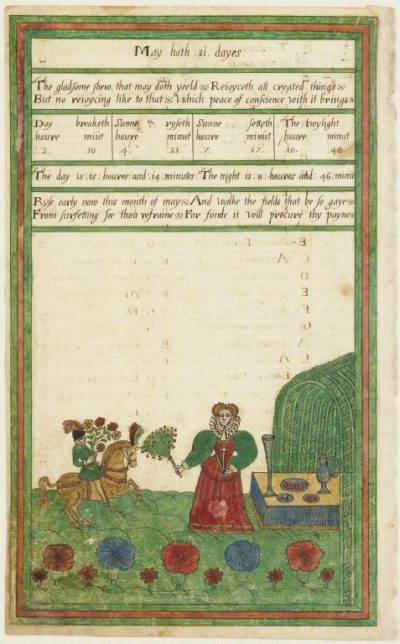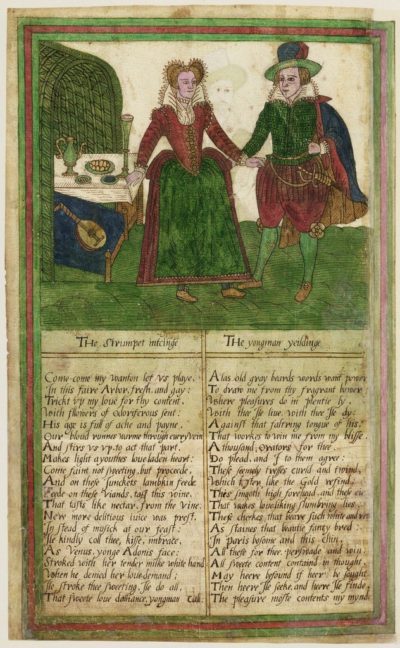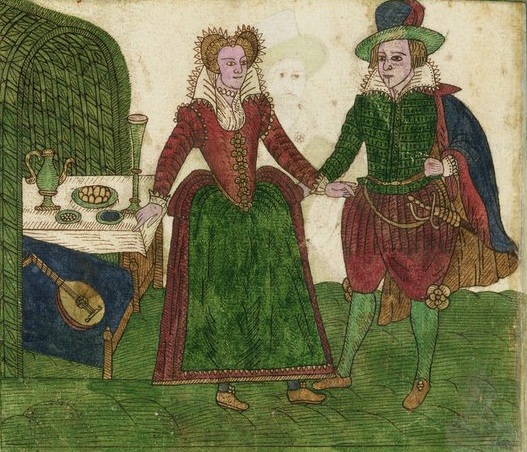Trevelyon’s Miscellany is a meticulously illustrated compendium of 1608. It’s stocked with a calendar, scenes from the Bible, current events, court, political figures, costumes, fabric designs, games, dances, etc. It’s among the marvels of bookcraft by a Londoner of means with the imagination and leisure to make this a book.
Two of Trevelyon’s illustrations contrasting love and sensuality are picnicky scenes: “May Hath 31 Dayes” and “The Strumpet Inticing and the Young Man Yielding.”

“The gladsome shew, that may doth yeeld. Reioyceth all created things. But no reiyocing like to that which peace of conscience with it brings.”
“May” is a lovers’ tryst, which gives an appearance of courtship. The legend for the “May Hath 31 Dayes” entry signals happiness: “Rise early now this month of May. And walk the fields that be so gay. From surfeiting see thou refrain. Forfend it will procure thy pains.” It’s illustrated with a woman anticipating the arrival of her lover, who approaches on a horse carrying a large bouquet of spring flowers. Her red dress with green sleeves suggests joy, love, and fecundity. She stands expectantly in a garden beside a table with fruits, nuts, and bread. Trevelyon might have linked May with lovers because it is traditionally a lusty month, an inspiration from Chaucer’s “The Franklin’s Tale.” *

“The gladsome shew, that may doth yeeld. Reioyceth all created things. But no reiyocing like to that which peace of conscience with it brings.” Thomas Trevelyon. “May Hath 31 Dayes.”
The second illustration, unrelated to “May,” is “The Strumpet Inticing and the Young Man Yielding” which is a ribald narrative. Here, Strumpet and Scholar engage in sexual banter that Boccaccio’s Decameron may have inspired. The Strumpet and the Scholar exchange is brief, and its outcome is never in doubt. The Scholar cheerfully yields to Strumpet’s proposition—a strong suggestion that Trevelyon may have meant this as a joke.
Trevelyon sets the debate in two poems arranged side by side:
Strumpet: “Come come, my wanton let us play,/ In this fair Arbor, fresh and gay.”
Scholar: “Alas old gray beards words wan power/To drive me from they fragrant bower/Where pleasures do in plentyly.”
Featured Image: Detail “The Strumpet Inticing and the Young Man Yielding.” Thomas Trevelyon. The Trevelyon Miscellany of 1608:
* Geoffrey Chaucer’s “The Franklin’s Tale” on May 6th:
So on a day, early in the morning-tide,
Unto a garden that was there nearby,
In which they had made their arrangement
For victuals and other provisions,
They go and amuse themselves all the long day.
And this was on the sixth morning of May,
Which May had painted with its soft showers
This garden full of leaves and of flowers. . .
See Thomas Trevelyon. The Trevelyon Miscellany of 1608: A Facsimile Edition of the Folger Shakespeare Library MS V.b.232, ed. Heather Wolfe. Washington, D.C.: Folger Shakespeare Library. 2007

